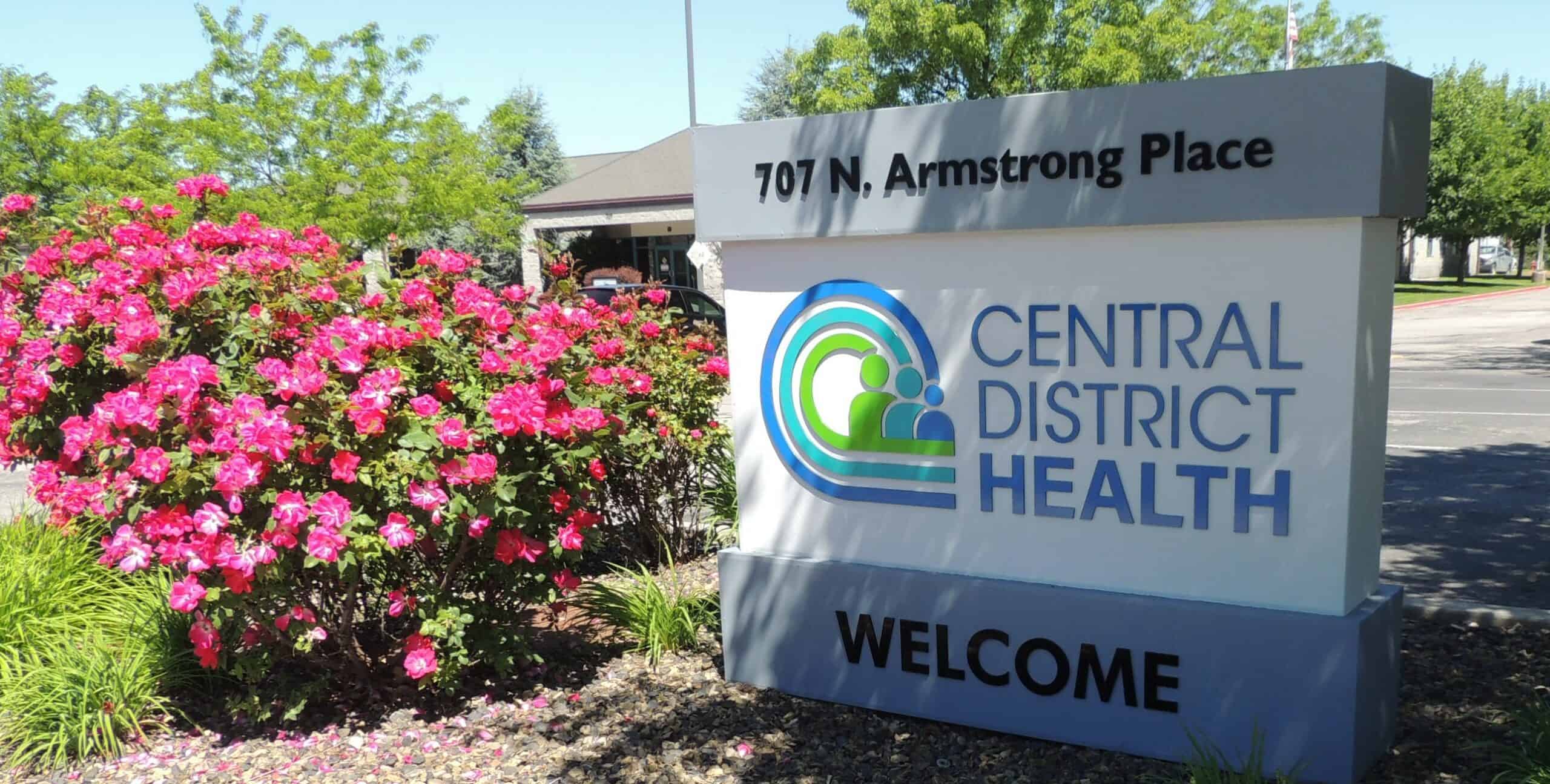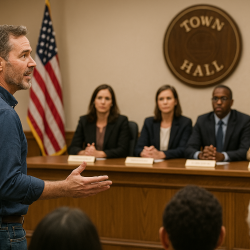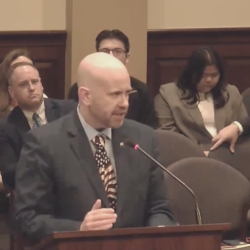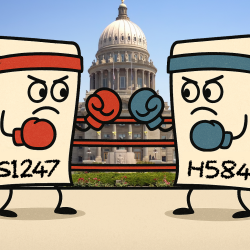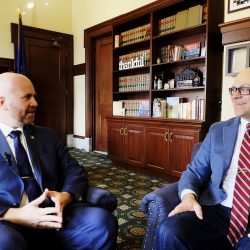This morning, the Central District Board of Health spent more than two hours listening to expert testimony regarding the efficacy and potential side effects of the mRNA COVID-19 injections. The question at hand was whether Central District Health (CDH) should continue offering these mRNA injections at free or reduced prices for those without health insurance or who cannot otherwise afford them. In the end, the board voted to table the issue, effectively maintaining the status quo indefinitely.
Those voting to table the issue were Jane Young of Ada County, Betty Ann Nettleton and Crystal Rodgers of Elmore County, and Katlin Caldwell of Valley County. Voting against the motion to table were Ryan Cole and Greg Ferch of Ada County, and Clay Tucker of Boise County.
There appeared to be a potential error regarding the vote procedure. Commissioner Tucker made a substitute motion to table until the August meeting and to submit samples of the existing COVID-19 shots to an independent testing lab. However, the secretary — a staff member at CDH — told Chairman Ferch that the original motion to table had to come first. For what it’s worth, ChatGPT suggested that the motion to table until a time certain should have been voted on first.
This issue arose following Southwest District Health (SWDH)’s decision last fall to cease offering COVID-19 injections to its residents. Niklas Kleinworth wrote a great piece for the Idaho Freedom Foundation about the implications of that decision and what should come next. Unfortunately, the members of the CDH board voted to continue “trusting the science,” so to speak.
I’m not qualified to argue the merits (or lack thereof) of mRNA injections, so I’m not going to do that here. In fact, very few people have enough knowledge to deliver an informed opinion on the subject. For the rest of us, the question is: who do we trust?
As I was listening to expert testimony this morning, it struck me that the issue at hand is not scientific, but political. When Dr. Cole cited a study showing higher rates of myocarditis and pericarditis than the CDH providors had indicated, I heard one of the pro-injection attendees beside me quietly scoff. That clarified the issue for me. Most people who have strong opinions about COVID-19 injections are unlikely to be moved by any form or quantity of scientific evidence, because their minds are already made up.
The central issue is trust. Who do you trust? Who does your doctor trust? Studies can say whatever you want them to say, and there are enough of them that you can pick and choose which ones to deem reliable. I don’t have the knowledge to individually evaluate each study. What I can examine is rhetoric, and in that arena, the shifting statements from the pro-injection side are worrisome.
Remember when the COVID-19 injection was said to prevent infection entirely? That turned out not to be true, so the goalposts moved: now it supposedly prevents severe illness and death. I’m not so sure about that either. At least there were supposedly few side effects. Or were there?
We were told to “trust the science”, and Dr. Anthony Fauci even claimed that criticizing him was akin to criticizing science itself. Yet the most qualified person in the room this morning to evaluate the efficacy of the injection was Dr. Ryan Cole himself, but he was outvoted. I’m sure you’ve noticed that every article about him in the corporate media makes sure to mention the sanctions against him by the Washington State Board of Health, but that’s tautological reasoning. The reason Dr. Cole has faced sanctions is because he spoke out against the COVID-19 injections, not because he was necessarily wrong. In other words, the attacks on his name were political decisions, not scientific ones.
I found an article from the Washington Post about SWDH’s decision to cease offering COVID-19 shots particularly interesting. The subheading reads: “This Idaho health district banned public clinics from distributing the coronavirus vaccine as widespread fear during the pandemic fades from public memory.”
Did you catch that? I think that the author unintentionally admitted that it was fear that drove the COVID-19 hysteria. If you’ve ever seen the movie Contagion, you know how the story was supposed to go, because the writers and producers worked with public health experts in developing their script: A deadly virus emerges from China, the government locks us down until a vaccine is developed, the vaccine works like magic, and we’re allowed to return to normal life once we take the shot. In the Hollywood version, people were rightly afraid of catching a virus that killed nearly everyone it touched. In real life, COVID-19 turned out not to be as apocalyptic as we feared.
Now that the fear of suddenly dying from COVID-19 has passed, what policy decisions should we make? In his article about SWDH’s decision, Niklas Kleinworth explained how much money is at stake:
The federal government largely subsidizes the COVID vaccination program to allow health districts to offer the vaccine at cost. Available support exceeded $1.3 million in federal grant funding and more than six staffers in the prior fiscal year for Southwest District Health alone.
Correspondence with the Idaho Department of Health and Welfare revealed the Southwest District Board of Health’s decision to end the COVID vaccination program would save $620,000 this year.
Kleinworth noted that only 128 doses of the shot had been distributed to the 300,000 people served by SWDH. Nearly 600,000 people live in the jurisdiction of CDH, yet a presenter stated that only 315 people had received the shot. How much taxpayer money has been spent to deliver the shot to those 315 people? How much state and federal money has been laundered into the pockets of Big Pharma via COVID-19?
Greg Ferch made a point in his debate that I think deserves more attention. Pharmaceutical companies spend massive amounts of money advertising their drugs directly to consumers via television. Regular people like you and me aren’t experts; we don’t know how effective these drugs are, nor how severe the side effects might be. Yet Big Pharma tells us to “ask your doctor” for this or that drug. Why? Because they need to create demand for their products.
The COVID-19 pandemic was the biggest boon for Big Pharma in recent memory. Not only did the climate of fear drive demand for their products, but state and local governments funneled billions of tax dollars into their coffers. This raises questions about the intersection of public health policy and the profit motive of pharmaceutical companies. I’m a capitalist, and I believe that corporations investing in research to create important medicines should be able to charge for their products. But does that mean taxpayers must subsidize them as well? During the height of the pandemic, I noted with incredulity how the Idaho Dept. of Health & Welfare was acting as the marketing arm for Big Pharma.
Ferch also pointed out that many of those who urged CDH not to cease offering the injection in the name of choice had previously supported allowing employers to mandate the shot as a condition of employment.
Perhaps the most telling statement came from the very first member of the public to testify. I didn’t catch her name, but in urging the board to maintain the status quo, she said that healthcare providers look to public health services for guidance on best practices. She warned that if CDH were to withdraw the COVID-19 shots, the healthcare community would begin to lose trust in public health.
I found that statement illuminating. As I said above, this whole discussion is about trust. And trust in healthcare providers among regular people has plummeted as we’ve learned how much influence pharmaceutical companies and bureaucrats like Dr. Fauci wield in that field. Does maintaining trust within the healthcare community require CDH and other public health organizations to blindly follow the dictates of Big Pharma?
This discussion is just the latest chapter in a growing debate about how much power society should cede to experts in various fields. The entire postwar order has seen a steady erosion of political power from our elected representatives to unelected bureaucrats, who are considered to be above petty partisan politics. But today we’re seeing increasing pushback against this technocratic system, as regular people realize that many so-called experts not so.
It will be interesting to see where the Trump Administration goes with this issue. President Trump still proudly touts Operation Warp Speed, the project that brought an mRNA vaccine to the public, but Health and Human Services Secretary Robert Kennedy Jr. has expressed skepticism. With CDH deciding to maintain the status quo, we must now await direction from Washington, D.C. In the meantime, the long-term testing continues. I suspect it will still be many years before we fully understand the implications of this new medical technology. Until then, I think public health districts should be very careful with what remaining trust they still hold among the people.
Feature image courtesy of Central District Health.
Please take a moment to thank our sponsors: Lynn Bradescu’s Keller Williams Realty and Money Metals Exchange, both of which support bodily autonomy.
Gem State Chronicle is a reader-supported publication. To receive new posts and support my work, consider becoming a free or paid subscriber.
About Brian Almon
Brian Almon is the Editor of the Gem State Chronicle. He also serves as Chairman of the District 14 Republican Party and is a trustee of the Eagle Public Library Board. He lives with his wife and five children in Eagle.


